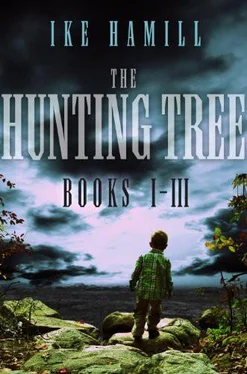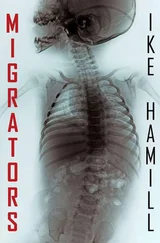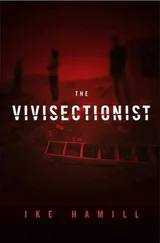“Yeah, he started with John Tooley a few weeks ago,” said Ken.
Mike nodded. “Wish there was something more I could tell you.”
They sat silent for a few moments.
“You ready for some lunch?” asked Ken.
“Absolutely.”
* * *
DR. KEN STUART LED MIKE a few buildings down from his office to a steak house. They kept the conversation light while they walked down the block, in deference to the beautiful day. They joked about the weather and talked about old friends until they had settled in the privacy of a booth with menus tilted between them.
“So how long are you out of a job—do you know?” Ken asked, trying to sound casual.
“Who knows,” said Mike. “I really don’t want to talk about it.”
“That’s cool,” said Ken.
“I miss working—trying to combine the paranormal with my genetic research. That was my passion, you know? I really think I’m on to something, but now I can’t even work on it if I wanted to.”
“Why’s that?” asked Ken. “Just because of the investigation and the lawsuits?”
“That’s not the half of it,” Mike explained. “Our last case, the one where Gary died, was for this engineer guy, and he made me sign all these long documents. Turns out I was handing over my intellectual property if anything went wrong. I didn’t even realize that at the time, but when the shit hit the fan, I lost my rights to even work on anything combining technology with paranormal investigation.”
“Wow,” said Ken.
“Yeah. But seriously, let’s change the subject,” said Mike.
“No problem.”
“You know what’s weird? When I first got into paranormal research I ran into something that reminds me of your kid,” said Mike.
“My kid?”
“You know, the clumsy kid.”
“Oh sure,” said Ken, realizing that Mike was referring to Davey Hunter.
Their waiter approached as they talked.
“I studied the history of genetics for a while. Before there was solid genetic theory, there were some surprising myths that had interesting scientific components wrapped into them. Hi there,” Mike said, turning to the waiter. “What do you have on draft?”
The waiter looked at the ceiling and turned his head to the side as he recited, “Shipyard, Guinness, Bud.”
“Let me get a Guinness,” said Mike. “Ken?”
“Diet coke?” asked Ken.
“Ready to order?” the waiter asked.
“Give us a few,” said Mike. “Where was I?”
“Ordering a liquid lunch?” smiled Ken. He liked catching up with Mike. It gave them both a chance to talk like they did when they were younger—before they had careers and responsibilities.
“Yeah,” said Mike. “You’re buying right?” he asked, laughing. “Anyway, if you went back a couple thousand years, there were some sophisticated theories about how groups maintained their genetic health.”
“Really?” asked Ken. “I thought natural selection was a silent partner.”
“It was amongst the Romans or Greeks,” Mike explained. “What I’m talking about you’d have to go to more tribal areas. Away from big culture. Like Africa or North America—away from Europe, South America, or Asia, where people were forming big super-colonies. The tribal people had pretty interesting practices; eskimos too—they had the same ideas.”
“What kind of ideas?” asked Ken.
“Well, like beached whales, or dolphins. You’ve heard of mass strandings?” asked Mike.
“I guess,” said Ken. “You mean when lots of dolphins all beach themselves at the same time?”
“Exactly,” said Mike. “Marine biologists have tons of theories, but none very satisfactory. They’ll say things like there was a disturbance in the magnetic field, or the animals can’t see a slowly sloping beach or something. They want to blame the environment for everything, but animals have always needed to quickly adapt to changing environments. All those theories sound like a bunch of bullshit. Way back, tribal people displayed the same behaviors.”
The waiter returned with their drinks. Mike took a long sip of his beer and wiped the foam from his stubble with his open hand.
“Ready to order?” asked the waiter.
Mike took another sip of his beer and pointed to Ken.
“I’ll get the burger with cheddar, medium, and house fries,” said Ken.
“Sir?” the waiter turned to Mike.
“Fish and chips, the onion soup, and the Greek salad,” said Mike. “Lots of bread with the salad, please.”
The waiter retreated, still writing on his pad.
“Hungry?” asked Ken.
“You have no idea,” said Mike. “So these whales and dolphins. There are a bunch of oral histories among indigenous North Americans talking about the same thing with people.”
“Really?” asked Ken. “Mass suicides? Like the Heaven’s Gate cult, or Jim Jones, or something?”
“Yeah,” said Mike, “mass suicide. And the reason they did it was because they knew that their genes were polluted. If the whole tribe had the same mutation, they’d figure it out. They knew that if any of them lived to breed, they would pass it around until the whole race would be doomed.”
“How could they know that?” asked Ken.
“It was like a highly specialized instinct. People who believe in it think that we don’t have a need for this instinct anymore because the population of man is thriving, but if you look at some of the marine mammals, they’re right on the hairy edge of survival all the time. If there was a mutation that shortened the lifespan, or caused the offspring to fail to thrive, they’d be sunk, so to speak. So when a group evolves with a trait like that, it carries with it this trigger. Get enough individuals together who all have the same trigger, and they get this uncontrollable urge to commit group suicide,” explained Mike.
“I think I get it,” said Ken, “but it seems a little far fetched.”
“Is it really though?” asked Mike, sipping his beer. “Think about the complexity of other mechanisms that have evolved. There are some really intricate feedback loops and dependencies there. If we didn’t have any medicine and our population was really small, you’d need ways to ensure that truly worthy individuals breed. Something above simple survival of the fittest.”
“Wouldn’t that just be handled case-by-case?” suggested Ken. “Some guy is sickly, so no woman will mate with him?”
“True enough, but there are different kinds of mutations. You’ve got lethal mutations, loss-of-function, gain-of-function, dominant negative. Like your Marfan we were talking about before. What if there’s a type of mutation that goes unnoticed, or even becomes an attractor? You’ve heard of epigenetics?”
“Sounds familiar,” said Ken. “Remind me.”
“Epigenetics is when an environmental change influences the way a gene is expressed,” said Mike.
Ken raised his eyebrows.
“I’ll give you an example: you could be perfectly healthy, but you carry a gene for diabetes. You have one kid, and everything is fine. But then you go through a period of famine before you father your second kid. Your kids could have nearly identical DNA, but the famine flipped on the gene for the diabetes, so your second kid has it and your first never has a problem.”
“Could that happen?” asked Ken.
“Some studies link environmental effects to life expectancy of grandchildren,” said Mike.
“Grandchildren? That’s unreal,” said Ken.
“I know, right?" Mike sat back and finished his beer.
“So why does that remind you of my case?” Ken waved back towards his office building.
“Oh, yeah,” said Mike, reinvigorated. “That’s the most interesting part,” he hunched his shoulders and dove back into his narrative. “Along with these group suicides, you also get the rogues.” He twirled his fingers in the air. “A rogue mutation produces an individual who survives the mass suicide.”
Читать дальше











